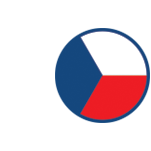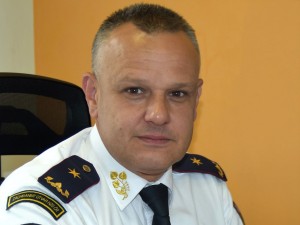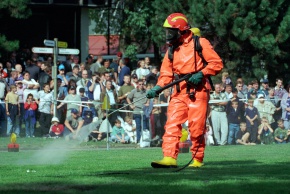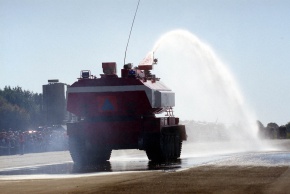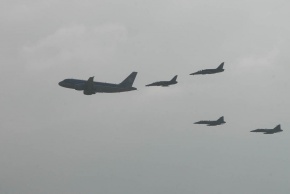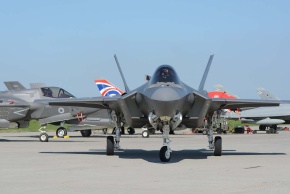News
I'm proud of what I do, where I work, and who I work with // Humans of NATO Days
He attended the event for the first time years ago, as a professional soldier. He was there when the 157th Rescue Batallion of the Czech Armed Forces transformed from an army unit to a firefighting unit. He started as a deputy commander, now he commands the Emergency Unit of the Fire and Rescue Service of the Czech Republic himself. As he said, he and other members of the department do not do it for money - but for people and they get paid. And the equipment they use to save lives and eliminate the consequences of natural disasters is presented every year at the NATO Days in Ostrava & Czech Air Force Days. David Kareš, Commander of the Emergency Unit of the Fire and Rescue Service of the Czech Republic.
What are the main tasks of the Emergency Unit of the Fire and Rescue Service of the Czech Republic?
The Emergency Unit of the Fire and Rescue Service of the Czech Republic is headquartered in Hlučín, but has companies in three locations. Apart from Hlučín, there are two in Jihlava and Zbiroh. Our priority activities are based on predestination. We are a nationwide centrally controlled unit, which provides support and synergy to the first-response units, firstly in long-term interventions, in specific interventions and with the involvement of specific equipment and special equipment at our disposal. That is the main thing we were created and designed to do.
In the beginning of our operation, there were natural disasters, which also proved necessary this year during the floods, but over the years we have also started to deal with special issues both within the Czech Republic and abroad. And since February of this year, we have 10 warehouses or workplaces in the structure of the Emergency Unit, with central supplies of the Fire Rescue Corps of the Czech Republic, where the material is contained both for the protection of the population and for emergency accommodation or emergency catering. This means that at the moment, in addition to rescue activities, we also have tasks related to the storage, handling and distribution of central emergency supplies.
Are the units that are stationed in Jihlava and Zbiroh any different from the Hlučín unit, or do they have the same tasks?
There is only one emergency unit. It is one single national unit, we have no territorial affiliation. We are really a nationwide unit and our superior level is the General Directorate of the Fire and Rescue Service of the Czech Republic. There are two rescue units here in Hlučín, and one in Jihlava and one in Zbiroh. They are called companies and there is a difference, albeit partial. There is one rescue company in each location - Hlučín, Zbiroh, Jihlava - which is identical. In addition, there is one in Hlučín, which has personnel, equipment and material for special activities. It is a service cynology, gunnery activity, diving activity, large-scale water pumping, then it is equipment and means for decontamination of persons and equipment on a larger scale, and some other specific activities.
How does the Emergency Unit differ from regular fire departments?
The Fire and Rescue Service of the Czech Republic is divided into fire brigades of regions, of which there are 14 in the Czech Republic, and these within the area coverage have their units and stations deployed to perform the tasks they are given. The rescue service is a completely separate unit which is destined for completely different activities. It is true that in the system in which we operate, there are things that are the same. We have the same management through the General Directorate of the Fire and Rescue Service of the Czech Republic, the dispatch of forces and resources always goes through the national operational information centre, we operate under the same law and we are all basically the same firefighters. That is the basis of it all, and that is good.
We, unlike firefighters at call stations, don't leave in 2-3 minutes. For us, it is not even technically possible to do it, and given what we have and what we are designed to do, our departure can leave within tens of minutes, and if we are talking about the departure of a large amount of equipment or larger number of people, it is within hours. The fundamental difference then is that for us an intervention equals a long-term deployment. The average time of one of our interventions is in the order of tens of hours, sometimes even days. At conventional stations, it is on the order of tens of minutes. There is simply a difference in the activities that we do. I will give you an example: if there is a traffic accident here near our unit, we must, of course, do what the law says we must do. But the nearest department of the Moravian-Silesian Fire Brigade has the predestination for this traffic accident or something else, and it really requires us for the bigger things where they do not have enough resources at their disposal.
What are the requirements for members of the Emergency Unit? Can they come from "civilian" or are they more likely to be recruited from other departments?
The basic requirements are exactly the same as for any other member of the Fire and Rescue Service. That is, the officer must pass physical tests, and be in perfect health. He or she must pass psychodiagnostic tests so that he or she is personally and stress-tested acceptable to work in the department. So the basic conditions are the same everywhere. Of course, we at the Emergency Unit, with what we do and what equipment we have, prefer people with a technical background. We certainly want the person who joins us to have a Group C driver's license or possibly some other license, although we are able to provide people a driver's license.
On the other hand, we want that person to have some background or aptitude for using really specific equipment. Then it's just a matter of choosing whether or not he fits in our unit personally. We recruit mostly from the civilian world. It doesn't happen and we don't want to pull people from county fire departments. I think a person who wants to go into the fire service decides for themselves whether it's better for them to go that route and work in a shift pattern at the station or to come to us in a slightly different pattern and do that specific job. I think that's what he should do in the long run. And that's what it's about.
You started your career in the Czech Army, with the 157th Rescue Battalion. How did the work of the unit under the army differ from being part of the Fire and Rescue Service?
Just a slight correction - it's true that I started my career in the Army of the Czech Republic, but the beginning was in military school and after school in the anti-aircraft missile troops. Only then, over time, did I move to the 157th Rescue Battalion, which was here in Hlučín. And that was also an intermediate step to going under the Ministry of the Interior and the Fire and Rescue Service. It is true that my career in the army was long and I like to remember it. On the other hand, I have to say in all fairness that coming under the Fire and Rescue Service and joining that service was probably the best decision of my life, which I have never regretted, and it has again taken me further in the work that we do.
The differences there were quite significant, not even in equipment, because we moved with the equipment and at the same time we worked with it, even though we knew from the beginning that we were going to have a big modernisation, which we are still doing and there is still a lot to do. But the fundamental one was the change in the operating system. The army and its deployment of forces and resources within the Integrated Rescue System is different from the Fire and Rescue Service. The Army's priority is also for external security, whereas the Fire and Rescue Service is for internal security. I personally am very comfortable with that at the moment and with what we are doing. And the way we've learned to operate has been the critical difference. In the system of deploying and operating the equipment, and even within the whole system. It's generally the same, you're working with people who have taken an oath, are under civil service law, and are doing their job for the safety of the citizens of the Czech Republic. In principle, we are all the same, and that's a good thing. But still, firefighters are a little closer to that internal security.
So you were also at the birth of the Fire Service of the Czech Republic in 2009. Can you describe how the department has evolved since its inception? How has your role in the department evolved?
The reorganization and integration of the department into the Fire and Rescue Service was terribly complicated. It was a really complicated process. There were a lot of legislative issues to sort out. A lot of people who served and still serve here today were and are former professional soldiers. This meant that the law had to be amended, property issues had to be resolved in the area of delimitation. But the main and essential thing was to find our place in the Fire and Rescue Service. I completely understand that when we came under the fire and rescue service, we were quite understandably an unknown to most of them. There was huge scepticism about whether it would be of any use, whether it would be usable, whether it was meaningful. I always understood that, and our job was to convince everybody that it did make sense, to show that we were able to offer or fill that space that maybe was missing in the system.
I wouldn't even say that my role was extremely important, everybody had an important role. I started on 1 January 2009 as a Deputy Commander with the executive units under me, and my role was primarily to ensure that the units were trained, ready, but at the same time we needed to learn the real deployment in the intervention in cooperation with the Integrated Rescue System. As time went on, once the former Commander, Brigadier General Radim Rehulka, left, I was offered the position of commander, which I was very proud to accept. I have been the commander here ever since. From the beginning there was a big expansion of the unit, from the beginning we were delimited here in Hlučín, which quite understandably did not make it the most credible. To have a central nationwide unit in the east of the country is not a happy solution. Everybody knew that, so the very next year we expanded with a company in Zbiroh in the west of the country, and over time we expanded with a company in Jihlava to fill the middle of the country.
Of course, I can imagine that for better range or more effective deployment we will have another company that will be somewhere in the north, because for us at the moment those northern parts of the country are very difficult to reach because of the infrastructure. But, importantly, we have significantly increased and improved the range and the range times, we have increased the capabilities and the resources that we are able to deploy on the ground, and I believe that we have established ourselves in the Fire and Rescue Service so that everybody already knows what we are able to provide. We say we are not extra, we don't want to make ourselves God knows what. I always say that our equipment is any Fire Department equipment, any county's equipment, it's just in our garage and I give them an officer that's trained to operate it.
The Emergency Unit has been deployed to all major disasters in the Czech Republic - the explosions in Vrbětice, the tornado in South Moravia, and the recent floods in the Moravian-Silesian region. Are you personally involved in these interventions? Can these events be compared in terms of the complexity of the intervention?
By virtue of my position, not that I wouldn't like to, but I don't have the time to be at every intervention. I have to say, on the other hand, that the big and extreme interventions, floods or tornadoes, I personally participate in. In principle, if only to be able to provide a command and control system on the ground for our units, and that particular deployment, because I completely understand that the commander on the ground does not and cannot know our exact capabilities and the resources that we have and how we operate with that. My role on the ground is to find the right Emergency Unit role to help them as much as possible or recommend procedures that we are able to do that they don't normally do. It's understandable, you listed the big, important interventions, but there have been an awful lot of them in general in the 16 years that we've been operating.
I have mention to Vrbětice, which I always think of as a thing that was a huge milestone within the Emergency Unit. It was the longest intervention ever by the Integrated Rescue System. I was in Vrbětice recently when I was invited to tour the site to mark the 10th anniversary of the first warehouse explosion. For us, that meant six years of our lives - six years during which our members were not in Vrbětice for two days. Historically, in retrospect, I take this as one huge miracle that nobody was hurt, and on the other hand, as a satisfaction that we did our best to limit the risk of any emergencies for our people. Nobody really got hurt, and it was a very difficult and dangerous situation. Since then, or during that time, we have also dealt with floods that have been in the Czech Republic, we have been involved in all of them - the tornado, the forest fire in Hřensko, covid, and the huge deployment within the covid when we did specific activities.
Of course, as the risks and dangerous situations expand, so does our deployment. We operate a lot abroad, often transporting humanitarian aid or other materials, but also in rescue or liquidation work. Either this is connected with large-scale water pumping or with some kind of emergency power supply. Recently, what is very important, what we are preparing for within the entire Fire and Rescue of the Czech Republic, is the fight against forest fires. So the officers are prepared to be able to operate abroad. Last year we were in Turkey and Bulgaria, the year before that in Greece. You could say that we have really done the whole of Europe.
You also have experience in rescue operations abroad, for example, rescuing people from a flooded cave in Thailand or transporting humanitarian aid to Kiev. What do you think are the biggest challenges associated with international cooperation in rescue operations?
It has two levels. One, I would liken it to Thailand, when I was there with a colleague from the Fire and Rescue Service of the capital city of Prague. Not to save anyone at that moment, there were others there for that and they did a really luxurious job. We were there to be able to offer and possibly solve the problem of pumping water out of the caves so that the evacuation of the boys would be as easy as possible. This was then not realised due to a significant change in the situation on the ground. But the main thing was that, as a small republic somewhere in the centre of Europe, we have the experience, we have the system, we have the resources and we have the trained people to do it. That means that the demonstration that we are able to help even in such a distant country even in such a difficult event, we are able to mobilise forces and resources and we are able to assess the reality, they take that as very important.
That's one thing. In all the international activities, whether it was the earthquake in Turkey or forest fires, it shows that both the system that we have in the Fire and Rescue System and in the Integrated Rescue System works for us because we are able to offer it. We have it and we have it working. The problems that there are with it, it always depends on the specific location, the specific emergency. Of course, it's something different in an earthquake, it's something different in a forest fire, it's something different in transporting humanitarian aid. The big unknown and the big problem is the actual transportation to the site, if we are talking about overland travel. You mentioned Kiev, we were there in 2014, if I am not mistaken. I was there as a commander at that time. That was 1 500 km that we covered, you could say, in one piece, with only short stops so that we could be back as soon as possible, because the security situation there was not the rosiest. And the demands on the drivers, on the people and on the equipment are great. But unless we're talking specifically about transportation, it's always about making sure the system works on the ground. Because each country is specific and we need to ensure that we can do what we can do effectively. And then it's the local conditions.
For example, this spring when we were in France for the floods. Floods that are in temperatures around zero bring their own specifics. It's challenging for people because it's cold, you're perpetually wet, it's windy, and you have to work with resources that are for bulk water pumping. On the other hand, the other extreme is fires. For example, in Greece, when it was extremely hot, there could be a fire all around you at any moment. You have to deal with the retreat route, but at the same time you have to deal with little things like water for people, making sure that nobody collapses, that nobody overheats. It's a terrible collection of things and activities to think about. But I'm really proud of what I do and where I work, the organisation I work for.
We have learned over the years, we have taken lessons from past deployments, and we are always improving the way we operate. Today, we are really in a state of discovering less things and implementing more. And that's good. And again, I'll say it again, I really take pride in what I do, where I work, and who I work with, because the people that I have around me, and the organization that I work in, it's not because we have a fire department sign and it might look nice. I've really gotten to know a lot of great people here who are able to do it not because they're doing it for the money, but they're doing it for the people while getting paid, which is probably the main thing.
Every year, the Fire and Rescue Service of the Czech Republic presents itself at the NATO Days in Ostrava & Czech Air Force Days. For many people, it is primarily an event about aircraft, but that is only a small part of what is presented there. How do you perceive this event?
I have a bit of a personal relationship to this event, because when I was still a professional soldier, we were already participants in NATO Days. That was when NATO Days was in its infancy, it looked very different than it does today, and it's true that I can compare the years and how NATO Days has evolved. We started there with green equipment in the military days. Over time, as we transformed into firefighters, we were there almost every year as part of the equipment and resource presentation. However, apart from that, in agreement with the organisers and the Czech Army, based on the requirements, we also help in some things related to logistics of the whole event.
I have to say that for me, NATO Days is first of all a very prestigious event for the Czech Republic, but also for all those who are there and who have the opportunity to show their work. When you say NATO Days, everybody imagines a fighter jet that flies over there, makes a terrible cow and everybody looks at it. It's good for a lot of enthusiasts because people don't normally come across it. But NATO Days for me is a demonstration of the link between external and internal security of the citizens of the Czech Republic, it has to go hand in hand. I still say that you cannot say that external defence without internal defence or vice versa can work. The common element is defence and that is where it is shown.
I always try to walk the site and get a feel for what the developments in equipment are and what the participants involved are in general. When you see all the partners that are there trying to present their work and the passion with which they are doing it, that's when the message to me is that even though the misfortune does not hike the mountains but people, and that we've had it for the last while, we're prepared for it. We have a lot of people, a lot of equipment, a lot of resources, modern resources ready for it, but at the same time, the NATO Days show that we have somewhere to go.
I completely understand that the economic situation in the world is difficult, but I think we should not skimp on security. And the NATO Days show that a little bit. It is beautiful military equipment, it is close to me, I was a professional soldier, but it is also functional, modern, nice equipment for firefighters, ambulance services, police, all the different services. If we go there with the equipment, every year it has some overlap, which we try to show in cooperation with the Fire and Rescue Service of the Moravian-Silesian Region. I can mention, for example, we presented at the NATO Days our hardened tankers, whether it's Titan or Triton, which are vehicles that were created just on the basis of Vrbětice and have a little bit of an overlap with military technology. They were created from military chassis or based on some military technology and they are in the service of firefighters. I have to say that their use has been very successful not only in fires in dangerous landfills, but also in Hřensko. We presented there the large-capacity pumps that we have just for large-capacity water pumping, some of our earthmoving machines or specials that we use for natural disaster relief, and so on.
There was already a lot of that equipment there, and I believe that we will be able to convince visitors to the event in the future that as a component - I'm going to speak purely for the Emergency Service now - that we are constantly preparing ourselves to do our best to make the citizens here feel safe. I think the basic content of NATO Day is not about aircraft, but it is about safety.
|
|
It's true. The motto of the event since the first year is "Our security cannot be taken for granted".
Yes, our security cannot be taken for granted, unfortunately. We have to invest in our security, but we have to know how and what to invest in and we must not be afraid to say it out loud, it will not come on its own.
Is there anything you would like to add in conclusion?
By the fact that times are fast, and by the way they are fast-paced in a lot of things, maybe thank everybody. First of all to my people, my officers, but also to my staff who provide support to those officers in general at all levels. To thank them for their work, for their commitment, because this has been a very challenging year for us. If I take it, I said it somewhere recently, it's not just the floods, but, for example, just before that we were at the unexploded bomb disposal in Litvínov, and there were more of those things in general this year. So it was a very challenging year and our people handled it with honour. I really want to thank them for that. And not just them, but all the firefighters in general at the volunteer, company, professional level, I would like to wish them to always come back in good health and thank them for their cooperation with the rescue service, which is great on all sorts of different levels.
